Hans Zimmer Interview – The Art of Film Scoring
Though we’ve had many exceptional figures grace the pages of MusicTech over the years, we’re extraordinarily honoured to speak to one of the most innovative, revolutionary and highly sought after composers on the planet: the incomparable Hans Zimmer. His soundtracks have enhanced many of the greatest movies of the last four decades, from Gladiator, the […]
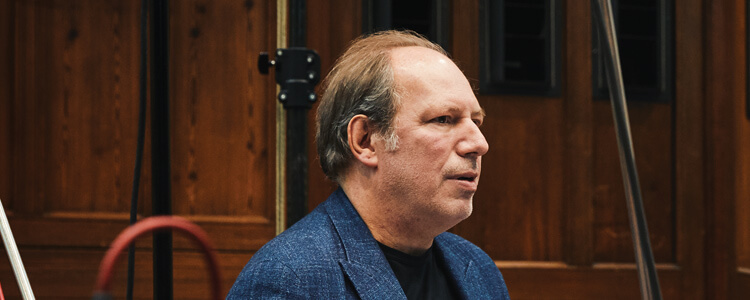
Though we’ve had many exceptional figures grace the pages of MusicTech over the years, we’re extraordinarily honoured to speak to one of the most innovative, revolutionary and highly sought after composers on the planet: the incomparable Hans Zimmer. His soundtracks have enhanced many of the greatest movies of the last four decades, from Gladiator, the Dark Knight trilogy and Interstellar to the recent Dunkirk. In this interview, we speak to a modern creative genius about breathing new life into the art of film scoring.
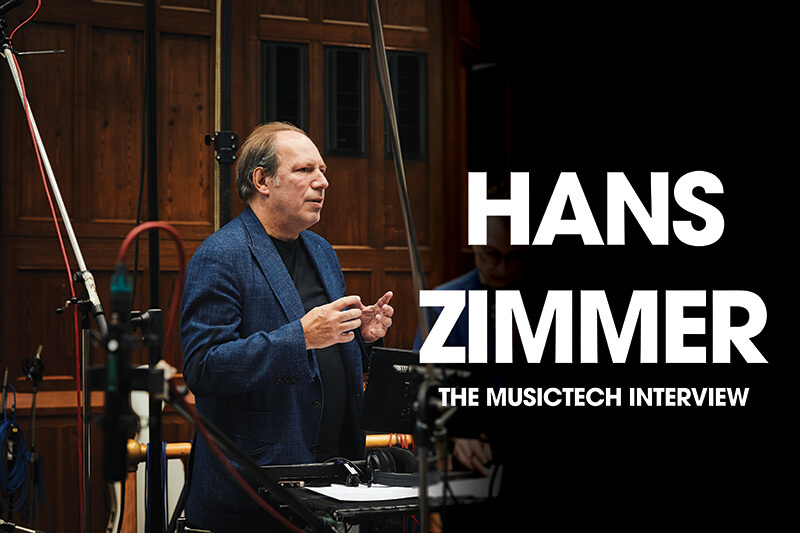
“The art of being a film composer hasn’t changed,” Hans Zimmer tells MusicTech, when we’re granted a rare interview with the soundtrack master. “The basic idea remains the same and that is to ask a question: ‘Why are we having music here?’”
If anyone knows about the art of composition, then it’s Hans Zimmer. His name has become synonymous with breathtaking, resonant scores and his staggering body of work covers a veritable checklist of the some of the most important films of their respective decades.
From early work such as the subtle and empathetic Rain Man soundtrack or the laid back, country-ambience of Thelma and Louise, to his Academy Award-winning score for Disney’s The Lion King – not to mention the Ridley Scott epic Gladiator – Hans has proven time and time again that he is a composer of incredible dexterity – and that’s before we’ve mentioned his groundbreaking work with Christopher Nolan.
His scintillating scores for The Dark Knight trilogy redefined the sound of superhero movies while his fusion of organic sound design, beautiful melodies and orchestral excellence characterises his work on Inception, Interstellar and last year’s Dunkirk.
Yet despite these remarkable achievements, Hans’ unending desire to push the boundaries of what is possible sonically still drives him to innovate. Which brings us to Hans Zimmer Strings – the remarkable orchestral library from Spitfire Audio that we reviewed last issue. We’re curious to know how his interest in sampling, and his collaboration with Spitfire Audio, began?
“Needless to say I’m not in it for the money,” Hans says before telling us that it’s a relationship that goes back a long way. “I don’t think I’m telling complete porky pies if I say that we were the ones who started orchestral sampling at AIR after we did The Lion King.
“A couple of other composers [Christian Henson and Paul Thomson] thought it would be a good idea to pursue this further, so they were sort of doing a parallel thing to me. It just made sense that we would join forces eventually. We were overlapping on so many areas, dealing with questions like, ‘How often can you go and ask the same viola player to play the same note for a sample?’
“I approach sample creation with two specific mindsets: the first is how much inspiration and sound can I get out of the orchestra, and my other is to just try something really outrageous and see if we can make something that allows you to do what you ‘can’t do’ in the real world.”
One simple idea
We press Hans further on how he’s able to push the creative team at Spitfire Audio to realise this ambition.
“Fortunately both Paul and Christian have a similar recklessness to me! After they’d created the very beautiful, and very delicate Tundra, one of our ideas was what would happen if we went totally the other way: sample something that is actually physically impossible.
“At the end of the day, from my point of view, the key thing is not the studio – it’s how do we move air to create a sound? And how much air can we move in one go. This is more interesting to me than how it hits the microphones. So then the idea of this fantastic, huge orchestra was born. It was great for me to get everyone involved too, to see pretty much every player that’s ever played on any of our sessions all in one room together.”
Hans injected his own sampling ethos into the project.
“Creating the impossible has always been my interest,” he tells us. “I’ve never approached sampling with the idea of, ‘how do we fake an orchestra?’ It’s always been how do we expand on an orchestra?”
It’s obvious that Hans is extremely passionate about orchestral music. He tells us that, of all the things he’s achieved in his career, he’s most proud of how he’s used the orchestra creatively.
“There’s a great danger that they’ll become irrelevant. It’s been widely reported that concert halls have great problems getting filled. But you know, right now, I’ve got a tour going and at its heart, it’s just orchestral music playing, and we’re not playing concert halls, we’re playing arenas and having some truly marvellous reactions from the audience.
“We’re sold out for every night. So the orchestra is as relevant as it ever was. But it’s not just me, there’s a few other people as well, of course. Greats such as John Williams and Ennio Morricone are performing live also.”
There’s a personal motivation too.
“For me it’s always been really very important to support the orchestra,” he tells us. “They supported me, and very often they supported me under extreme circumstances. The times when I’ve been crashing into the wall with the burdens of deadline or the stress of budget. Suddenly you just walk into a room and you hear them lift your little tune up and make it soar. That truly is a collaboration.”
The Hans Zimmer Spitfire range
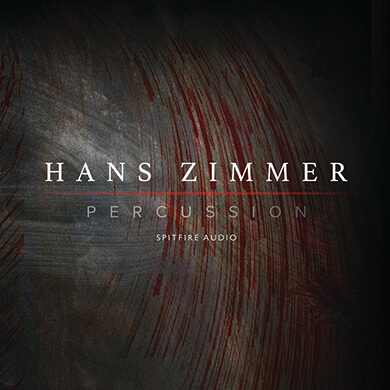
Hans Zimmer Percussion
£349
www.spitfireaudio.com
The first major collaboration saw Hans and Spitfire Audio building on their shared enthusiasm for sampling with a remarkably deep library that utilised Hans’ own award-winning team. Recorded at Air Studios and containing 12,225 samples of a variety of instruments and styles, produced and mixed by the man himself.
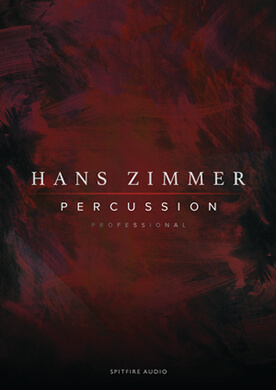
Hans Zimmer Percussion Professional
£549
www.spitfireaudio.com
The professional version of Hans Zimmer Percussion expands the sample count to a whopping 92,254, with additional mixes from Junkie XL, Geoff Foster, Alan Meyerson and Steve Lipson, as well as an all-new intuitive GUI and a host of video content. An expansive and versatile tool.
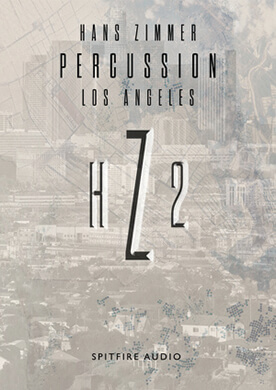
HZ02 – Los Angeles
£249
www.spitfireaudio.com
Spitfire Audio and Hans Zimmer present 34,335 samples of Jason Bonham playing his DW Vistalite kits at various notable Los Angeles film soundtracking studios, including Hans’ own ‘Cathedral’ space, as well as some exclusive modular-synth drum programmed content provided by Hans himself. Perfect for adding some peerless percussion sounds.
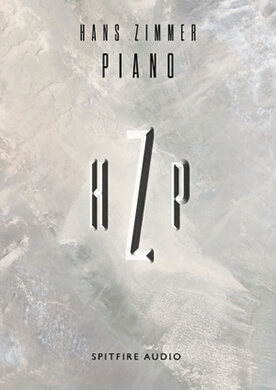
Hans Zimmer Piano
£349
www.spitfireaudio.com
Containing 88,352 samples of concert grand piano, recorded from pretty much every mic position conceivable, Hans Zimmer Piano was the fourth collaboration with Spitfire Audio and was motivated by what Hans describes as a ‘once-in-a-lifetime’ opportunity to build a world class writing tool.
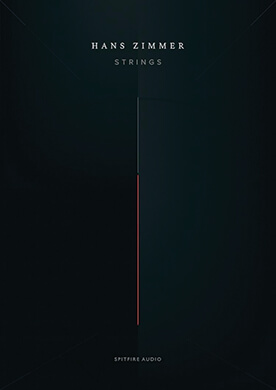
Hans Zimmer Strings
£549
www.spitfireaudio.com
The latest collaboration with Spitfire Audio is a truly audacious undertaking, as Hans says it was motivated by a desire to ‘see what would happen if we sampled something that is actually physically impossible”. The whopping 205,501 samples amount to a tool that is truly breathtaking in scope.
No time for caution
Music has always been a fundamental part of Hans’ life. From a young age he remembers his extremely musical mother taking him to classical concerts around his home city of Frankfurt, while his father (an engineer and inventor) would encourage him to physically modify their home piano. As time progressed, so too did Hans’ musical tastes. “Of course came the moment when I had to go and rebel against everything,” he remembers.
“I had my blues phase, I got really into Muddy Waters and people like that, then of course it was The Beatles and The Rolling Stones. After that I started delving into Kraftwerk, Tangerine Dream, Jean-Michel Jarre, Vangelis and all these incredible electronic musicians. Of course I also loved the weirder German bands like Can and Neu!”
After moving to England in the mid-70s, it wasn’t long before Hans started performing his own music live.
“It was probably around 1978 or so. I was actually in a punk band here in England and I spent all my money on synthesisers – literally. I had an EMS VCS 3 and was living in this flat in Brighton where you had to put a 5p into the meter to get electricity. There were so many nights back then when I’d have a great idea and I’d start working it out and then – boing! – the electric would go out. I often didn’t have enough money, so I’d just be sat in the dark for the rest of the night, thinking about my idea.”
Hans says that England, “wasn’t really the ideal place at that point to be wanting to make electronic music. If you didn’t have the money you’re just left in darkness! I envied guitar players at that point, and I think that’s why you’ve got a lot of guitar music in England.”
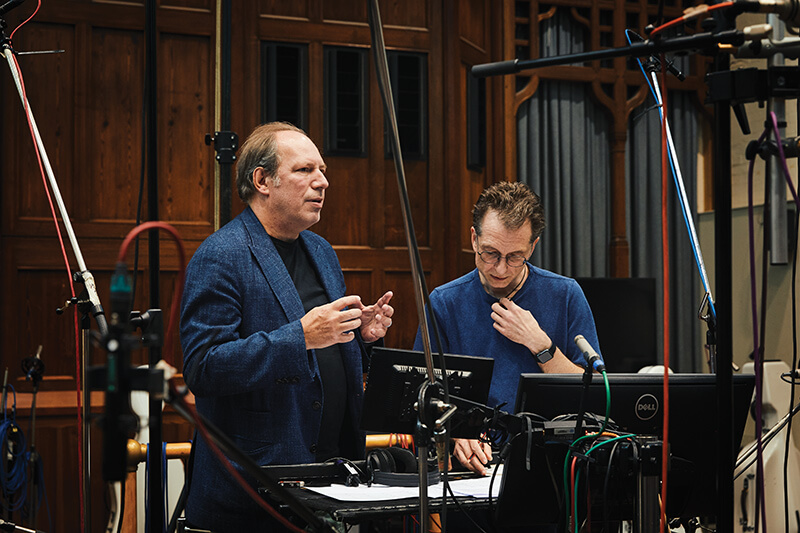
on numerous projects, including Gladiator and now on Hans Zimmer Strings. (© Spitfire Audio and Lee Kirby)
After recording demos at a studio in Fulham, Hans was drawn into the world of advertising jingles (with his synthesiser know-how a unique attribute) it was then that he started to become fascinated with the soundtracking process. “I learned that a lot of commercials are done by great directors who had broader visions for what they were doing,” Hans recalls. “That’s what I started to find really interesting: the storytelling aspect. It appealed to me more from a music-making point of view than just being in a band.”
“I was very enthusiastic, even though I’d never done anything like this beforehand. I’d go up to the director and say, ‘OK, what are we doing today?’ and then I’d make up some music on the spot. I loved that aspect – making really interesting things happen there and then.”
This desire to immerse himself in the story, and aurally bolster the narrative, is an attitude that Hans has retained throughout his career. “I think the basic idea remains the same on every project,” he says. “A composer has to always ask that question: ‘Why are we having music here?’ And they need to ask themselves, ‘Why is there an orchestra playing on this scene?’ A composer has to figure that out before they begin making music.
“When an audience comes into a movie theatre they want to have an emotional experience. All I’m trying to do, quite seriously, is open the doors that lend themselves to that. It’s not my job to tell the audience what to do or what to feel – I’m trying to enhance the film experience. It’s not about dictating or patronising in any way.”
“Really it’s the storytelling that is driving the process at all times,” Hans tells us.
“I think over the years my compositions have become leaner. I try to dot less ‘i’s’ and cross fewer ‘t’s’. I tend to leave more space for the audience to fill in.”
Top 5 Hans Zimmer Soundtracks
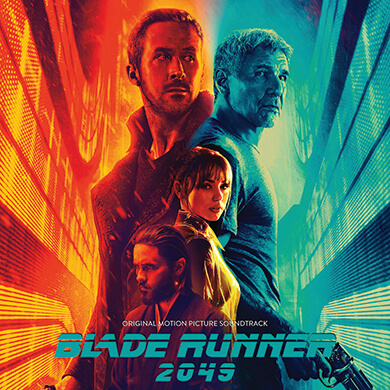
Blade Runner 2049
Following up Vangelis’ sublime soundtrack for the original, classic Blade Runner was no easy task – it’s one of the most justly-lauded soundtracks of all time, after all. That Hans (and Benjamin Wallfisch) managed to create such a wonderfully unique, deep suite of music, while still retaining the feel of the original is a truly remarkable feat. Hans took the sonic universe of Los Angeles in 2049 to a new level, helping to make Denis Villeneuve’s sequel every bit as rich as Ridley’s Scott’s masterpiece.
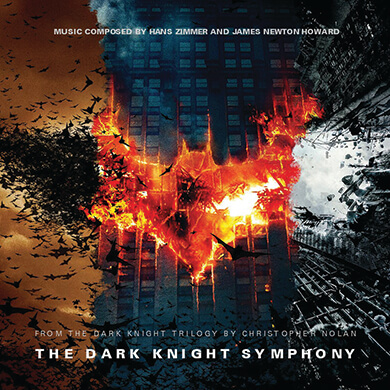
The Dark Knight Trilogy
OK, we’re cheating a little bit here by picking not one, but three films, but can you blame us? Across each movie Hans – with James Newton Howard on Batman Begins and The Dark Knight – joined director Christopher Nolan in reinventing Batman for the modern age. Fusing dark electronics and infectious percussion with some classic orchestration, this was a far cry from the caped crusader’s more comical outings. It’s impossible to imagine these films without the now iconic themes.

Gladiator
Created alongside Lisa Gerrard and bearing all the touchstones we’ve come to expect, Zimmer created a rich and rewarding score in Gladiator. Combining a plethora of instruments and the hauntingly beautiful vocals of Gerrard, this remains one of his best and most diverse efforts.
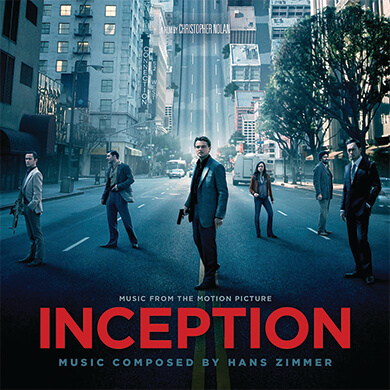
Inception
Inception’s score originated from a single note of Edith Piaf’s ‘Non, Je ne regrette rien’, which forms a key narrative component in the film. Featuring those infamous horns and the rapturous closer ‘Time’, this was Hans Zimmer at his innovative best. Until…
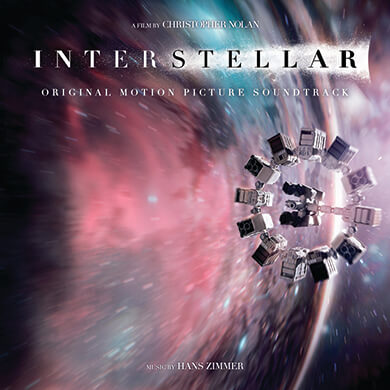
Interstellar
Seamlessly blending minimalistic themes with bone-shattering organ, Interstellar’s score resonated with audiences long after the credits rolled. Effortlessly shifting between tenderness, desperation and awe, this is arguably Hans Zimmer’s finest score to date, not to mention his personal favourite!
Introduce a little anarchy
Narrative is key to Hans’ creative approach, then, and his occasionally unconventional compositional methods – which can include utilising found sounds and organic textures – generally stem from very simple beginnings.
“A director will phone me up and say ‘I want to tell you a story’. As they’re telling me the story I’ll start to get ideas and the main one will usually be, ‘What’s the sonic world that we’re going to go and drop the audience into?’ So it’s not just instruments, I think if you just drop an orchestra on top of the sound effects then they’re too separate. What I try to do with my work is figure out how to bleed into the picture, bleed into the frame and bleed into the story. Blurring the lines between the sound design and the music. So sometimes you can’t tell what’s what.”
“Sometimes I’d create some electronic soundscapes, then play them to the orchestra and say, ‘You guys on the cellos, violins and basses or whatever, can you re-interpret the synthesiser sounds?’ Then things start to get interesting.”
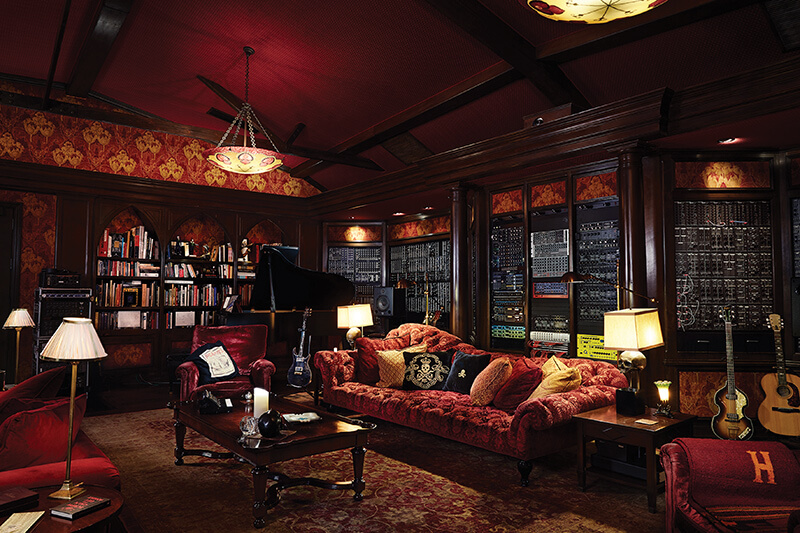
Hans’ fantastic, uniquely designed Remote Control Productions studio in Santa Monica, California is a thing of wonder. The beautiful gentleman’s club aesthetic is balanced by a wide selection of incredible music technology, in both the analogue and digital domains. We ask Hans how the environment helps him get creative, and where does he even begin when crafting his ideas? “I do the majority of composing there,” Hans tells us. “I love that studio, I really do. The design lends itself to my creative process. I wanted to build a space that I like to hang out in. It turned out that directors like to hang out in it too!”
Hans describes his studio as, “a very comfortable room to have ideas in and a very comfortable room to talk about ideas in. I’m not the kind of person who cares about how many hit movies you’ve done and how many grand successes you’ve had. Every director, every editor and every musician – we’re all a bit humbled before the task. We all get nervous about our out-there ideas or the crazy thoughts that might be floating around in our heads. To that end you have to make the studio a safe place. In this safe zone you can do very dangerous things.”
With regard to the technology in there then: “I have a bit of a problem,” Hans confesses. “I’m addicted to synthesisers. But it’s like this – a lot of old synths sound really, really good. What I use from a compositional point of view is actually relatively limited.
“It’s the fundamental quality of the sound that I find satisfying. I remember making a patch on a software emulation of a modular synth, and spending as long doing it on that than I would do on a real Moog System 55 or something like that, but it never quite had the same quality, it never quite got there. There was a kind of 1% quality that was missing from the emulation.”
“If you listen to my soundtracks for The Dark Knight trilogy and Dunkirk. The old analogue stuff is the kind of stuff that pins you to your seat.” Hans reveals “It’s like Chris Nolan insisting on shooting on film when it’s a lot easier to shoot everything digitally. Though don’t get me wrong, I use samples all the time, which of course is in a digital format.”
We ask Hans if this means he limits himself to the analogue world when composing. “The word ‘limit’ is probably the wrong one to use,” Hans says. “But when I’m approaching music-making I try to use only a few analogue synths and a sampler. I don’t really have any other software synths floating around. I try to really learn and experiment with the tools that I’ve got. I want to get the best out of what I have as opposed to being overwhelmed by having a thousand plug-ins, none of which I know really well.”
5 lesser-known Hans Zimmer soundtracks
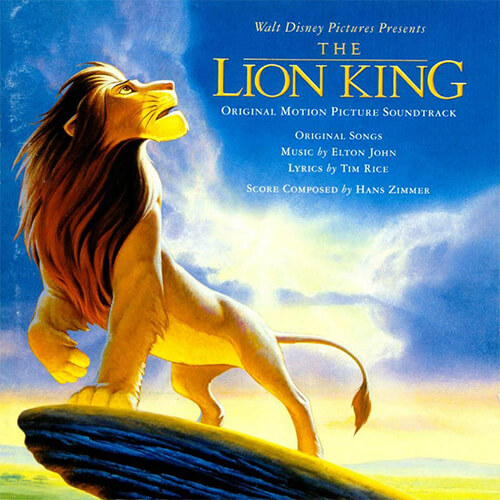
The Lion King
Musically, The Lion King is mainly remembered for its timeless songs by Elton John and Tim Rice, but it’s Hans Zimmer who penned the music behind some of the Disney classic’s most emotional scenes. We challenge you not to feel a lump in your throat whilst listening to it again.
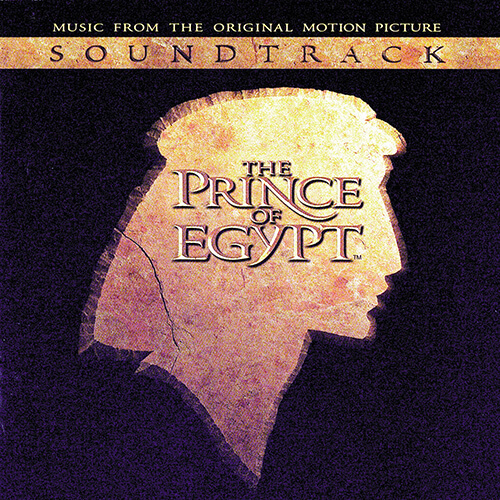
Prince of Egypt
Though Mariah Carey and Whitney Houston’s performance on title track ‘When You Believe’ takes the spotlight, Zimmer’s work on The Prince of Egypt is phenomenal; perfectly capturing the tone and setting, it’s well worth revisiting.
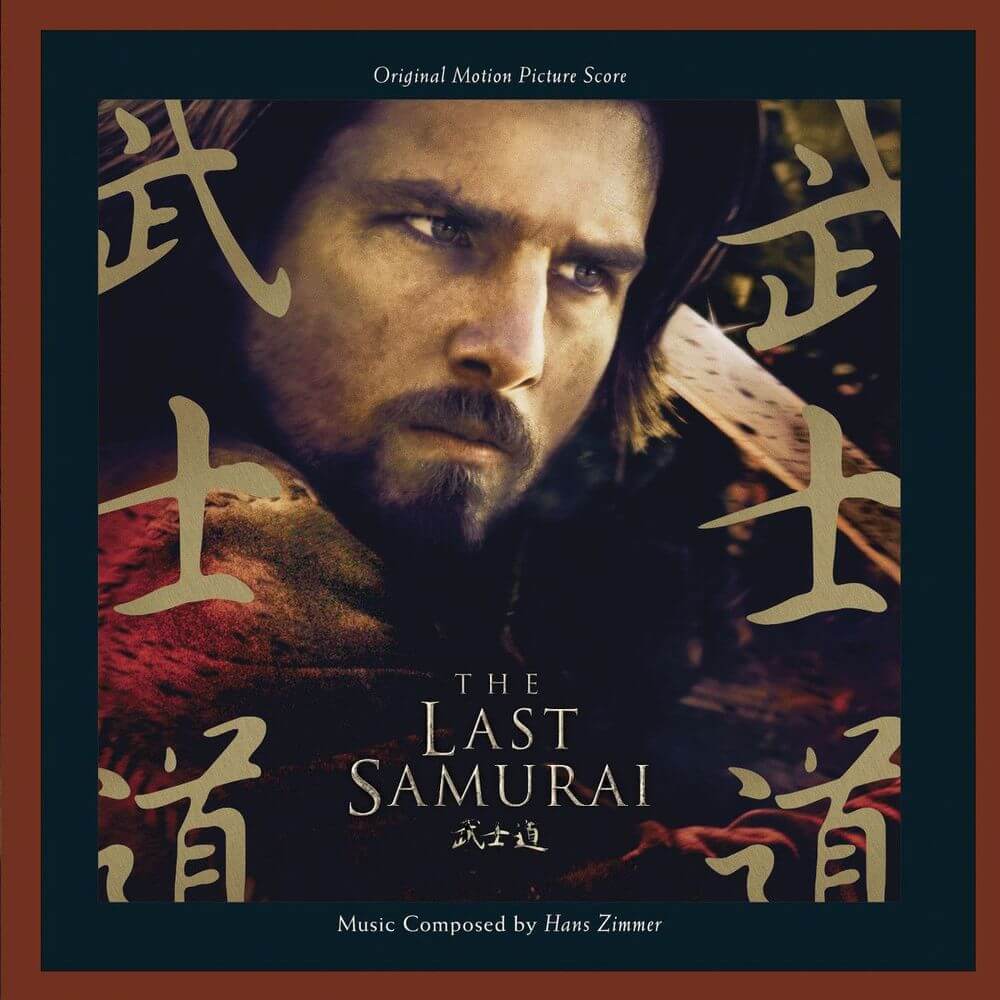
The Last Samurai
Though Tom Cruise’s inclusion caused some backlash to the film upon release, Hans’ score to The Last Samurai is something else. Interlacing his epic orchestral sweeps with traditional Japanese cues makes for fantastic listening, both in isolation and alongside the film.
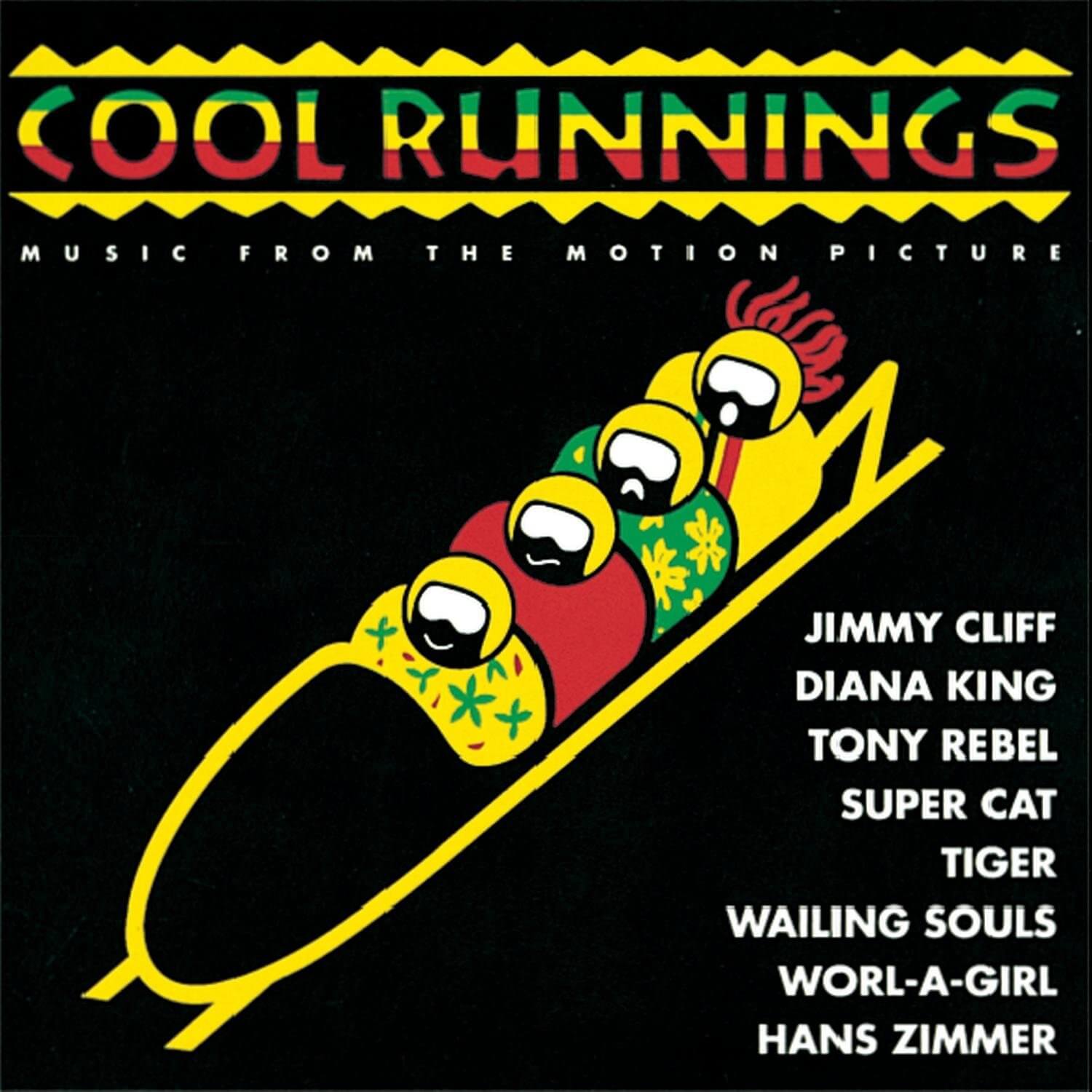
Cool Runnings
It’s hard to believe, but Hans was front and centre for the creation of this comedy classic. Unsurprisingly, this is a much lighter affair, one that sees Zimmer creating a much more playful and joyous collection of songs, though ‘The Walk Home’ is bound to tug on those nostalgic heart strings.
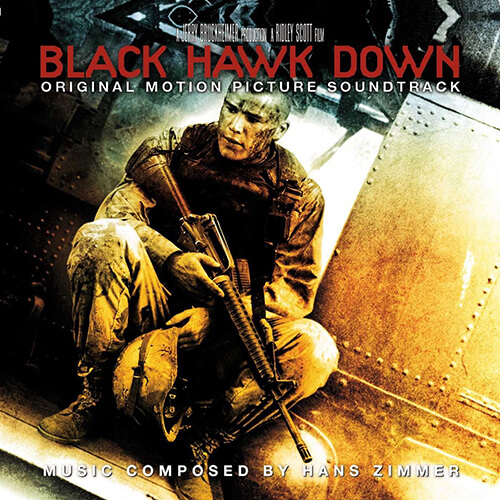
Black Hawk Down
One of his most varied of soundtracks, Black Hawk Down saw Hans trying out a little bit of everything. Peppered with an array of genres, the score explores a range of instrumentation to create something rather unique.
Regimental brothers
Hans’ mention of Christopher Nolan pricks our ears. The director of The Prestige, Inception, Interstellar, The Dark Knight trilogy and last year’s Dunkirk has been a constant creative companion for Hans over the last 13 years, with his scores complementing Nolan’s layered blockbusters perfectly. We’re curious to know more about the relationship, and how it began.
“Chris phoned me up out of the blue and asked if I wanted to do a Batman movie. I loved Chris but I didn’t want to do it – mainly because I found it difficult to get my head around splitting the musical personality between Bruce Wayne and Batman. So I kept saying ‘no’ and he said, ‘You know, there’s this word that I hear and I never understand and it’s the word ‘no’’.
“I relented and suggested that I work with James Newton Howard, a wonderful composer who I’d played music with before but never done a film score with. Working with someone else allowed me a greater opportunity to really think about the different personalities of the character, and make some interesting music.
“Working with James allowed me to take to The Dark Knight trilogy like a duck to water. We worked on different themes for different characters, but by the third movie, Chris had killed off all of James’s characters! So the third movie was just me.”
Hans’ investment in the narrative is clearly deep, and it’s obvious that both he and Christopher Nolan share a desire to try things differently on each project.
“Yes, Chris and I always talk at length before we start a movie. We talk about the plot and what are we trying to do. We also discuss what we haven’t done or things that we’ve touched upon but never quite completed.
“Interstellar is a good example of a score that was driven by the desire to do something different. That score was born out of us asking, ‘What haven’t we done?’ And of course the central theme of the movie, which was what it means to be a father. It was quite a philosophical film.”
The melding of sound design and music is perhaps most apparent with last year’s masterclass in tension, Dunkirk.
“For Dunkirk, Chris and myself had a lot of conversations about the film. Without giving everything away our central ambition was to create something that was constantly rising the tension all through the whole movie – which of course is impossible with just music, so there were lots of tricks involved. A big part of the experience of that film is the sound design as well. The team of creative people that we had working on the film was extraordinary and we all worked together, pushing everything to the limit.”
“The sound of the Stuka dive bombers was an interesting challenge, as there aren’t any around any more and it had such a distinctive sound, so we had to generate that ourselves (with a siren built and recorded in a 30-gallon steel drum) The team (in particular sound editor and sound designer Richard King) did amazing work.”
Hans tells us that, “Chris cared intensely about the Dunkirk project so everyone on the team was working their hardest. We all knew what his vision was. If you think about it, Dunkirk is not your usual Hollywood film: it’s quite a small, experimental movie and it’s very focused on a few characters. It’s about a subject that, outside of the UK, very few people really know much about. It was a movie that broke quite a lot of rules.”
It’s on again
Hans has recently performed some of his work live with an assortment of musicians, friends and, of course, a huge orchestra.
“The band and the orchestra are phenomenal and all the musicians that I have playing with me are amazing. Certainly here in England I had every great player that’s ever played on my sessions coming in to be a part of it. I felt I owed it to them in a funny kind of way.”
“We spent so much time doing all these scores together,” Hans says. “All the way back to The Lion King, Gladiator and all that stuff – and these musicians are the people that really played on those recordings. I kind of wanted to make it about them and not about me particularly. I wanted the audience to see who these faceless people who sit in the studios actually are. They might be playing french horns or cello or playing violins but they can really rock out amazingly well!”
Hans says that getting out on stage and performing his compositions to an audience was something that he found – and still finds – terrifying.
“Look, I’ve always had stage fright and I still get it to this day. It was Pharrell and Johnny Marr who persuaded me to perform my compositions live. They said words to the effect of, ‘One day you’ll have to leave the dark, windowless room. You owe it to people to look them in the eye. These people have bought your soundtracks and love your work – so be accountable and play this stuff.’
“It sort of made sense, and Pharrell in particular was someone who helped me feel more confident about it. There was another one of those talks where they were trying to get me to do something live. And I was just saying, ‘no, no, no, no’. I was starting to walk out of the door when Pharrell said, “I’m going to do the Grammys, do you want to play guitar?’ Only a fool would say no to that.”
“So I played the Grammys, but it was Pharrell’s show. It was really fun – it wasn’t me in the spotlight, it was him. I was just making some horrible noise in the background! I walked away from that thinking maybe I should do a bit more of this…”
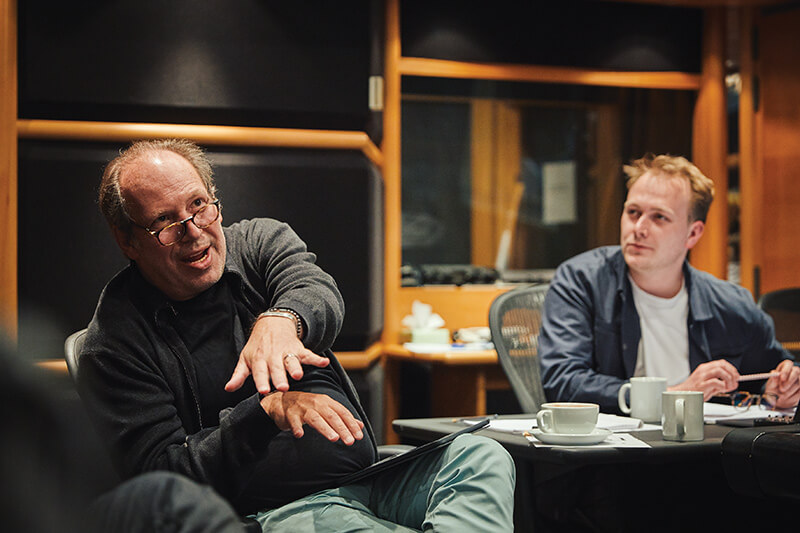
Before long, Hans had assembled his live team.
“The first shows I did were two nights at Hammersmith. Pharrell came along and did one night while Johnny did both nights. I was actually really surprised that people turned up. My whole fear was ‘What if no one turns up?’ It was a mystery to me why anyone would, to be honest with you.
“The interesting thing is that now, even with all that’s happened, I’m still as terrified as I always have been going out every night in front of people. It’s kind of become a part of me – the terror has become quite exciting. I absolutely enjoy it though. I don’t really have any stage craft whatsoever.
“Whatever comes out of my mouth, comes out of my mouth. I sort of think of it like a dinner party – and I just think that I’m going to play some music and then have a chat. No more than that really.”
Beyond the blue horizon
An obvious question, but one we can’t resist asking: does he have a favourite piece from his oeuvre?
“I usually answer that I don’t really have a favourite, or that I’m proud of them all, or that it varies day-to-day. The problem is that, for me, they’re all flawed in some way. Part of the live thing was to go back and try to fix some bits. Once you’re making a movie there comes a point when the film and the score is locked, which means you can’t go and fix that horrible chord that snuck in by accident, or whatever. Playing live allows me to clean things up. I can tweak the arrangement and change some of the voicings. Every night I’d endeavour to fix something else or make things a bit better.”
Having said that, one score does hold a special place for him. “If I really have to think about it, then the one I like as a total experience is Interstellar. I think that holds up very well. I enjoy playing that.”
It’s no secret that half the directors in Hollywood want to work with Hans Zimmer, but is there anyone that Hans himself would like the chance to collaborate with?
“What I love is getting new, younger composers involved. The things we did on Blue Planet II recently (with David Fleming and Jacob Shea) were fantastic – I’m happy to take on the role of a guy who’s done a lot and might have a couple of answers or might have a couple of questions. For musicians, it’s tough out there.
“You have to be a reckless idiot to want to become a professional musician. The chances of you making any livelihood is 0.0001%. So, for me, I’m happy to be in a position to help young composers to get going and make sure that they actually get paid for all the passion and the work they put into it, and focus on their craft of being a composer. I love that they’re young and often have wildly different ideas from me. That’s exciting. So who do I want to work with? I want to work with the next generation.”
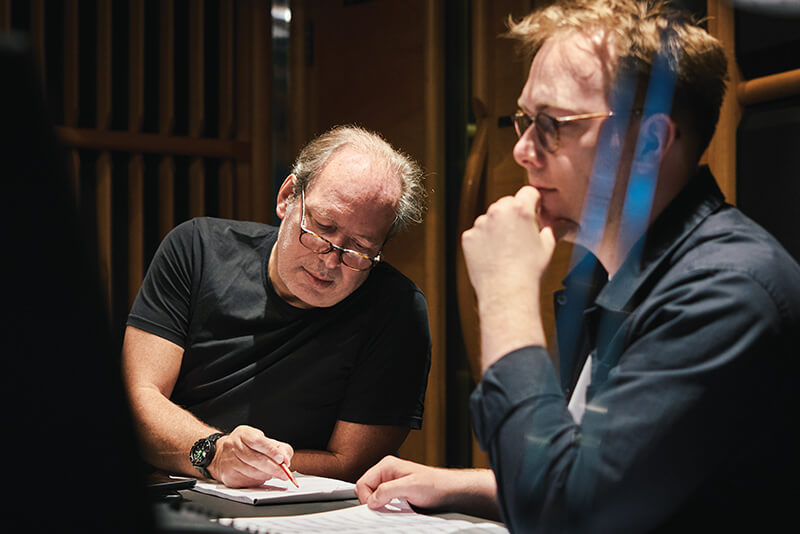
In a similar vein then, we ask about Hans’ upcoming projects, and will his work with Spitfire Audio continue?
“Yes, my work with Spitfire Audio really has to be an ongoing project as everything that I learned and everything that my sample team have done is wonderful. My sampling team is pretty much the same team since 1994. We have a great relationship.
“Merging these two teams together is an ever-developing, ongoing project. I’ve actually just been back at AIR Studios trying some more things out with Spitfire. Every time you try an idea it sparks another. I’m looking forward to seeing how well Hans Zimmer Strings does, of course. We’re driven by that constant desire to create tools that enable us to write music that nobody’s heard before.”
Hans reflects on his rich catalogue of music with characteristic modesty. “I don’t think any of my scores are ever really finished. After the movie comes out I’m often thinking about how I’d alter parts.”
“I remember going to the Tate Modern and looking at the Gerhard Richter exhibition and taking in all his abstract paintings and thinking, ‘how does he know when one of those is finished?’ I noticed that somewhere in the corner of these galleries full of abstract paintings there’d be an absolutely perfect drawing that he’d done.
“It’s like he was saying, ‘Just remember, I’m a master draftsman’. The abstract stuff isn’t just a guy throwing paint at the wall; he really knows his craft. Great artists know when something is finished, and that’s why I love working with directors, because they’re very good at going, ‘You’re done, move on to the next piece’.
“But, if left my own devices I’ll fiddle – I drive Chris Nolan crazy because I’ll fiddle around for days or spend weeks trying to get the perfect tune and I’ll say to him, ‘I’ll send it over tomorrow morning’ and then two weeks later he’ll remind me that I haven’t sent it – and I’ll say, ‘Well I haven’t quite got the sound right yet!”
As we wrap up our conversation, Hans leaves us on an insightful note into what truly drives the greatest composer in the world today. “I just hope the end result is interesting. The thing is, I’m not a perfectionist really, it’s just ideas breed ideas, and the only enemy we have is time. There’s just not enough time in the day and the night to do everything that you want to achieve. So, that’s my life.”